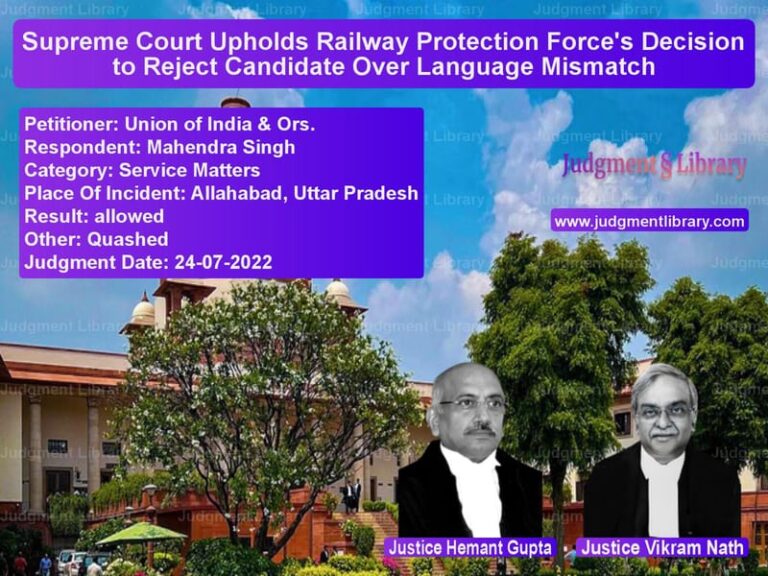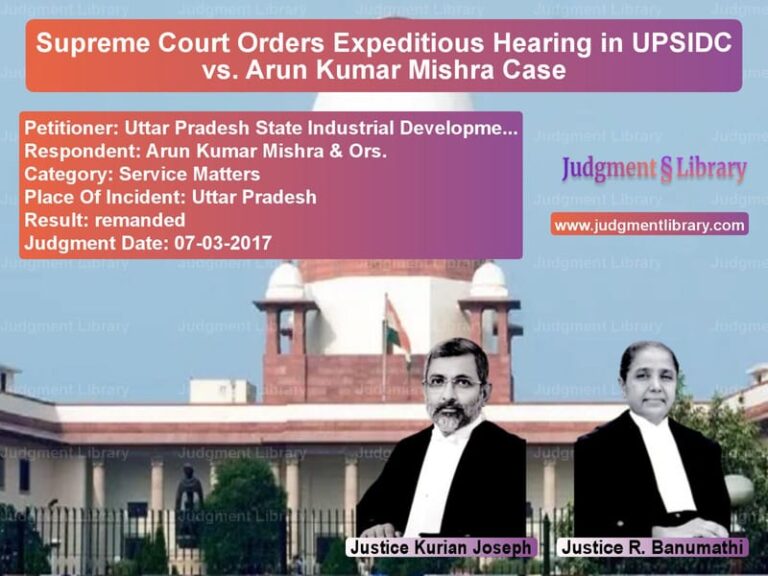Supreme Court Upholds Conviction in ESIC Contribution Case: Key Legal Analysis
In a significant judgment delivered on April 17, 2025, the Supreme Court of India dismissed the criminal appeal filed by Ajay Raj Shetty against his conviction for non-payment of Employees’ State Insurance Corporation (ESIC) contributions. The case, which originated from Bangalore, Karnataka, involved complex questions of liability under the Employees’ State Insurance Act, 1948, particularly concerning the definition of ‘principal employer’ and the obligations of company officials.
Background of the Case
The matter relates to M/s Electrixx (India) Limited, a company declared as a sick industry by the Board for Industrial and Financial Reconstruction (BIFR) in 2001. During 2010-2011, it was found that while the company had deducted Rs.8,26,696/- from employees’ wages as ESIC contributions, these amounts were not deposited with the ESIC. A complaint was filed against Ajay Raj Shetty, who was identified in company records as the General Manager and Principal Employer during the relevant period.
Appellant’s Submissions
The appellant, represented by senior counsel, made several key arguments:
“The appointment of the appellant was in July, 2009, to the post of Technical Coordinator in Respondent No.2. This Court’s attention was also drawn to the fact that proceedings before the BIFR was instituted in 2001, long before the Appellant’s appointment.”
The appellant contended that he was never the Principal Employer or General Manager, and that the prosecution failed to prove his designation through proper documentary evidence. He also argued that the company’s sick industrial status should have led to a more lenient approach from ESIC, as per Regulation 31C of the ESIC Regulations which allows for waiver of damages in such cases.
Respondents’ Counter-Arguments
The ESIC (Respondent No.1) maintained that:
“The High Court observed that despite there being sufficient evidence against the Appellant, he was convicted under Section 85(i)(b) of the Act and not under Section 85(i)(a) of the Act, thereby giving him a lesser sentence.”
They emphasized that the appellant had ample opportunity to produce evidence about his actual designation but failed to do so. Respondent No.2 (the company) supported the appellant’s position, stating that he was merely a Technical Coordinator and not involved in financial matters.
Supreme Court’s Analysis
Justices Sudhanshu Dhulia and Ahsanuddin Amanullah delivered a detailed judgment examining several legal aspects. On the crucial question of who qualifies as a ‘principal employer’, the Court analyzed Section 2(17) of the ESI Act:
“From the above, it is clear that the definition also includes a ‘managing agent’ of the Owner/Occupier in the case of a factory or ‘named as the manager of the factory under the Factories Act, 1948’ and for ‘any other establishment’, ‘principal employer’ would include ‘any person responsible for the supervision and control of the establishment’. Therefore, designation of a person can be immaterial if such person otherwise is an agent of the Owner/Occupier or supervises and controls the establishment in question.”
The Court distinguished the appellant’s reliance on previous judgments, noting that:
“J K Industries Limited (supra) dealt only with the Factories Act and do not aid the Appellant in the instant context.”
Regarding sentencing, the Court upheld the Trial Court’s decision to impose a lesser sentence under Section 85(i)(b) rather than Section 85(i)(a), despite the fact that employee contributions had been deducted but not remitted. The Court also rejected the appellant’s plea for symbolic punishment, citing its earlier decision in ESI Corpn. v A K Abdul Samad:
“The object of creating offence and penalty under the Employees’ State Insurance Act, 1948 is clearly to create deterrence against violation of provisions of the Act which are beneficial for the employees. Non-payment of contributions is an economic offence and therefore the legislature has not only fixed a minimum term of imprisonment but also a fixed amount of fine of five thousand rupees under Section 85(a)(i)(b) of the Act.”
Conclusion
The Supreme Court ultimately dismissed the appeal, upholding the six-month imprisonment and Rs.5,000 fine imposed by the Trial Court. The judgment clarifies important aspects of liability under the ESI Act, particularly:
1. The broad interpretation of ‘principal employer’ under Section 2(17)
2. The limited discretion courts have in reducing statutory fines under the ESI Act
3. The distinction between liability under the Factories Act and the ESI Act
The Court directed the appellant to surrender within two weeks to serve the remaining sentence, marking an important precedent in cases of non-remittance of employee welfare contributions.
Petitioner Name: Ajay Raj Shetty.Respondent Name: Director and M/s Electrixx (I) Ltd..Judgment By: Justice Sudhanshu Dhulia, Justice Ahsanuddin Amanullah.Place Of Incident: Bangalore, Karnataka.Judgment Date: 16-04-2025.Result: dismissed.
Don’t miss out on the full details! Download the complete judgment in PDF format below and gain valuable insights instantly!
Download Judgment: ajay-raj-shetty-vs-director-and-ms-ele-supreme-court-of-india-judgment-dated-16-04-2025.pdf
Directly Download Judgment: Directly download this Judgment
See all petitions in Company Law
See all petitions in Corporate Governance
See all petitions in Corporate Compliance
See all petitions in Employment Disputes
See all petitions in Bankruptcy and Insolvency
See all petitions in Judgment by Sudhanshu Dhulia
See all petitions in Judgment by Ahsanuddin Amanullah
See all petitions in dismissed
See all petitions in supreme court of India judgments April 2025
See all petitions in 2025 judgments
See all posts in Corporate and Commercial Cases Category
See all allowed petitions in Corporate and Commercial Cases Category
See all Dismissed petitions in Corporate and Commercial Cases Category
See all partially allowed petitions in Corporate and Commercial Cases Category







